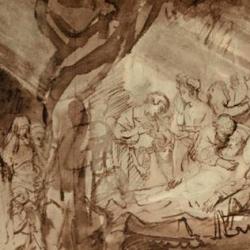Benedict XVI’s God’s Word: Scripture, Tradition, Office has some very good things to say, and some very questionable things.
The good first. Christ, he emphasizes, is revelation, and the presence of revelation is the presence of Christ. Scripture presents this presence in two ways. First, the presence of Christ is identical to faith “in which the individual meets Christ and, in him, enters into the sphere of his saving power.” Yet the presence of Christ also appears in what Paul describes as the body of Christ.” Benedict says that this phrase expresses “the way the community of believers – the Church – represents Christ’s active presence in this world, a presence into which he is gathering mankind and through which he enables them to share in his mighty presence.” Faith and the church should not be opposed: “Both of these together signify that believing is entering into the abode of Christ, into the abiding reality of Christ” (57).
Then the not so good.
Benedict presents a Trinitarian understanding of tradition: “At the beginning of everything that is handed down stands the fact that the Father gives away the Son to the world and that the Son for his part allows himself to be handed over . . . to ‘the nations’ – as a sign.” This traditio , this paradosis , persists as judgment and salvation “in the enduring presence of Christ . . . in his body, the Church.” Thus, the mystery of Christ is “the whole reality that is transmitted in tradition.” So far, I think, so good. But then he adds that the “decisive and fundamental reality that is always antecedent to all individual explications, even those of Scripture, and which represents what in actual fact has to be transmitted” (64). Insofar as the Father gives over Christ before the New Testament exists – well, yes, of course. But there was a Scripture that preceded Jesus, in the matrix of which Jesus and His work are to be understood, without which Jesus the Christ makes no sense. And besides that there is the old (and quite valid) inerrancy argument that Jesus and His words are inseparable. Jesus’ teaching is part of His saving and judging work, and the continuation of that saving and judging work through the Spirit-filled church depends on access to that teaching. There can be no talk of priority here: We know Jesus as Word and Speaker, speaking specific things. A silent Jesus is not a saving or a judging Jesus.
He presents several grounds for saying that tradition represents a surplus beyond Scripture. First, he claims that the role of Scripture is different in the Old and New covenants. Appealing to Paul’s distinction of letter and spirit, he concludes that “the age that dawned with the Christ-event appears as the answer to a series of hopes that expected the coming age to render Scripture, in an ultimate sense, quite superfluous through the immediate presence of the divine teacher in man himself” (54). The New Testament fulfills Israel’s “longing to go beyond the gramma in a new immediacy of God’s Spirit” (55). To be sure, there is a New Testament, but it doesn’t have “that conclusive and exclusive sense that, in Paul’s view, was attributed to it in the Old Testament” but exists as “the instrument for opening up the old dispensation into the spacious sphere of the Christ-event” (55-6). On this basis (and citing Bultmann!), Benedict says that this means that Scripture resists objectivizing and thus the “practice of the Church” in the Spirit has a priority over Scripture (62).
I don’t agree with Benedict’s understanding of Paul’s distinction or of the difference between Old and New, but let me develop an objection in a different direction: Here is perhaps the nub of the difference between Catholic and Protestant views of Scripture and tradition, and it’s a nub at a surprising point. For Protestants (at least “radical” Protestants of a Hamannian variety), God’s verbal communication is not some unfortunate second-class communication that will one day be surpassed; it is inherent in the relation of God to humanity. Because God is Word, He is a God who speaks and writes, and thus and only thus we know Him. Following a long tradition, Benedict appears to hope for a pure interior communication that bypasses the “limits” of language. From this angle, it’s surprising to discover that Protestantism is more fundamentally sacramental than Catholicism, insofar as Protestants believe that God always and everywhere, in new as much as in old, communicates through created means.
Proclamation, Benedict rightly says, is also interpretation (58), interpretation of Christ and of the Old Testament. It is also “interpretation of the Christ-event itself, on the basis of the Pneuma, and that means at the same time on the basis of the present ecclesiastical situation.” Proclamation includes interpretation on the basis of the present situation because Christ is alive and not dead, and because the church is a body inhabited by the lively Spirit of the living Christ (58). All this is quite good, but then Benedict supplements it with a brief summary of the development of the eschatological message of the kingdom toward the notion of the church. Oddly, he claims that “only a series of historical promptings . . . brought the original community to recognize that their efforts with Israel had finally failed and then to go out to the gentiles and, thus, to create the Church instead of the kingdom” (59). This concedes far too much to the liberal paradigm of New Testament history. I think Scot McKnight is on target in saying that “kingdom” is a concrete term in Jesus’ preaching: He announces the exaltation of God as the true King, and for that very reason announces the formation of a new order of the people of God under that divine King.
In any case, what Benedict makes of this development is that the church provides an authoritative interpretation “by the Spirit” of the New Testament. He then sets up this analogy: The New Testament provides an authoritative interpretation of the Old, so that there is both a “theology of the Old Testament” and a “New Testament theology of the Old Testament” (60). Analogously, there is a “New Testament theology of the New Testament,” what the New Testament teaches in itself; and then there is something like a New Testament to the New Testament, the “ecclesial theology of the New Testament” that is characterized as dogmatics (61). This “extra” in dogmatics is tradition. It is the church’s interpretation of the New as the New is the interpretation of the Old.
I think the analogy breaks down at several points. One might, for historical heuristic purposes, examine the Old Testament for a “theology of the Old Testament,” but in Christian theology the Old Testament has no independent standing. For Christian theology, the Old Testament is an incomplete book that only makes sense in the light of its final chapter in the New; for Christian theology, the Old Testament is about nothing other than Christ in His sufferings and glory (Luke 24). I might concede a loose analogy along the lines Benedict suggests, but his strong version only works if one assumes that dogmatics is (at least at some points, in some contexts) a
s infallible as the New Testament itself. But this is the question at issue between Catholics and Protestants, so an appeal to an analogy that assumes the Catholic position doesn’t address the Protestant objection. (In fairness, Benedict isn’t polemicizing; he’s simply explaining the Catholic view of tradition.)
There’s more to say, but let me return to one of the good things in Benedict’s account. He does not believe that scholarly investigation of the literal sense of Scripture is “an absolute criterion,” but he does believe that the literal sense of Scripture has a critical role to play: “Whatever can be known unambiguously from Scripture, through academic study or through simply reading it, has the function of a real criterion, against which even the pronouncements of the Magisterium must be tested” (66). Not everything a Protestant would want, but a crucial point.















